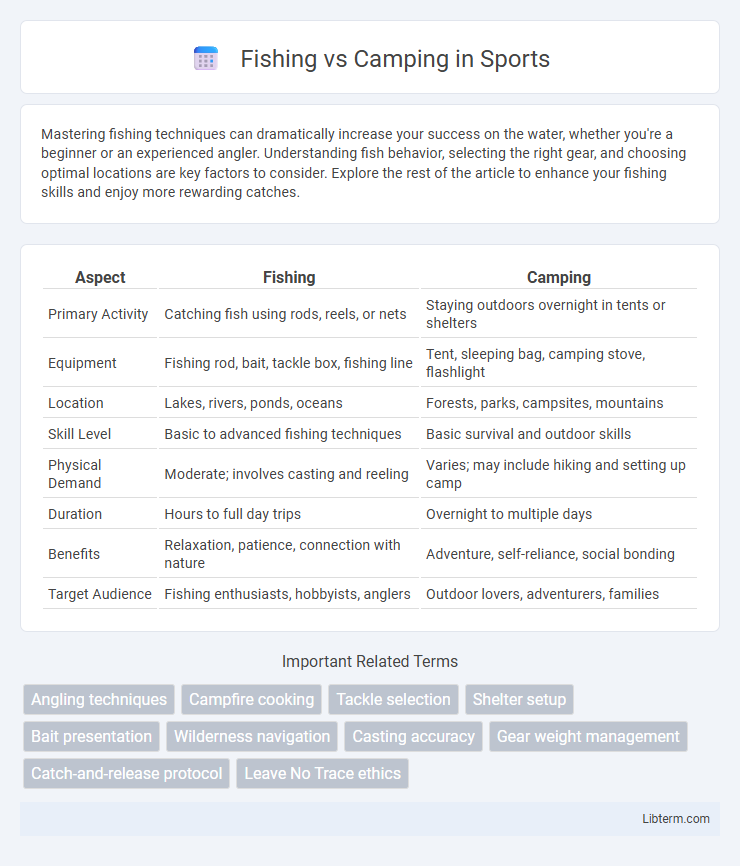Mastering fishing techniques can dramatically increase your success on the water, whether you're a beginner or an experienced angler. Understanding fish behavior, selecting the right gear, and choosing optimal locations are key factors to consider. Explore the rest of the article to enhance your fishing skills and enjoy more rewarding catches.
Table of Comparison
| Aspect | Fishing | Camping |
|---|---|---|
| Primary Activity | Catching fish using rods, reels, or nets | Staying outdoors overnight in tents or shelters |
| Equipment | Fishing rod, bait, tackle box, fishing line | Tent, sleeping bag, camping stove, flashlight |
| Location | Lakes, rivers, ponds, oceans | Forests, parks, campsites, mountains |
| Skill Level | Basic to advanced fishing techniques | Basic survival and outdoor skills |
| Physical Demand | Moderate; involves casting and reeling | Varies; may include hiking and setting up camp |
| Duration | Hours to full day trips | Overnight to multiple days |
| Benefits | Relaxation, patience, connection with nature | Adventure, self-reliance, social bonding |
| Target Audience | Fishing enthusiasts, hobbyists, anglers | Outdoor lovers, adventurers, families |
Introduction: Comparing Fishing and Camping
Fishing and camping offer distinct outdoor experiences that appeal to different interests and skill sets. Fishing engages enthusiasts with aquatic environments, providing opportunities for relaxation and sport through techniques such as fly fishing or deep-sea angling. Camping immerses individuals in nature, emphasizing shelter-building, cooking, and exploration in diverse terrains like forests, mountains, or deserts.
The Thrill of Fishing: Key Benefits
Fishing offers a unique blend of relaxation and excitement, providing an adrenaline rush with every catch while promoting mental well-being through immersion in nature. It enhances patience and concentration, making it a rewarding activity for both novices and experienced anglers. The thrill of reeling in a fish generates a sense of accomplishment and deep connection to aquatic ecosystems, distinct from the serene solitude found in camping.
The Allure of Camping: What Makes It Special
Camping offers an immersive connection with nature through activities like hiking, stargazing, and campfire storytelling, fostering relaxation and mental rejuvenation. Unlike fishing, which centers primarily on the sport and skill of catching fish, camping encompasses broader outdoor experiences that enhance physical health and social bonding. The versatility of camping environments--from forests to mountains--creates unique opportunities for exploration and adventure, appealing to a wide range of outdoor enthusiasts.
Essential Gear for Fishing vs Camping
Fishing requires specialized gear such as rods, reels, bait, tackle boxes, and fishing lines designed for different water conditions. Camping gear focuses on tents, sleeping bags, cooking equipment, and portable lighting to ensure comfort and safety in outdoor environments. Both activities benefit from durable clothing, waterproof storage, and navigation tools tailored to their specific needs.
Health and Wellness Benefits of Each Activity
Fishing enhances mental wellness by reducing stress through immersion in nature and promoting mindfulness during the patient practice of angling. Camping boosts physical health by encouraging activities like hiking and setting up tents, which improve cardiovascular fitness and muscle strength, while fostering restorative sleep in natural environments. Both activities support emotional well-being by facilitating connection to nature and providing opportunities for social bonding and relaxation.
Social Aspects: Solo vs Group Experiences
Fishing often provides a solitary experience, allowing individuals to connect with nature quietly and reflectively, while group fishing trips foster camaraderie and teamwork through shared challenges and successes. Camping, on the other hand, typically encourages social interaction, with group camping promoting bonding via communal activities like cooking and storytelling around the fire. Solo camping offers a mix of solitude and self-reliance, attracting those seeking personal growth and mental rejuvenation amidst nature.
Environmental Impact: Fishing vs Camping
Fishing can disrupt aquatic ecosystems by removing key species and causing habitat damage from gear like nets or lines, which may lead to declines in fish populations and loss of biodiversity. Camping impacts terrestrial environments through soil compaction, vegetation damage, and waste generation, potentially disturbing wildlife and contributing to pollution if not managed properly. Both activities require responsible practices to minimize environmental footprints, such as catch-and-release techniques in fishing and Leave No Trace principles in camping.
Cost Comparison: Budgeting for Each Adventure
Fishing expenses typically include costs for rods, reels, bait, licenses, and sometimes boat rental, which can range from $50 to several hundred dollars depending on the gear quality and location. Camping costs often involve purchasing tents, sleeping bags, cooking equipment, and campsite fees, with average expenses around $30 to $100 per night plus initial gear investment. Budgeting for fishing might require more upfront investment in specialized equipment, whereas camping can have lower recurring costs but potentially higher initial setup expenses.
Best Destinations for Fishing and Camping
The Pacific Northwest stands out as the best destination for fishing, offering abundant salmon and trout in rivers like the Columbia and lakes such as Lake Washington. For camping enthusiasts, Yellowstone National Park provides unparalleled opportunities with its diverse landscapes, from geysers to forests, ideal for tent and RV camping. Coastal Maine combines both worlds, featuring excellent saltwater fishing and scenic campgrounds along the rugged Atlantic shores.
Final Thoughts: Choosing the Right Outdoor Escape
Fishing offers a tranquil retreat where patience rewards with the thrill of the catch, while camping provides immersive experiences in nature, fostering connection and adventure. Selecting between fishing and camping depends on personal preferences for relaxation versus active exploration, as well as the desired interaction with the natural environment. Both outdoor activities enhance mental well-being and offer unique opportunities to disconnect from daily routines and embrace the serenity of the wilderness.
Fishing Infographic

 libterm.com
libterm.com